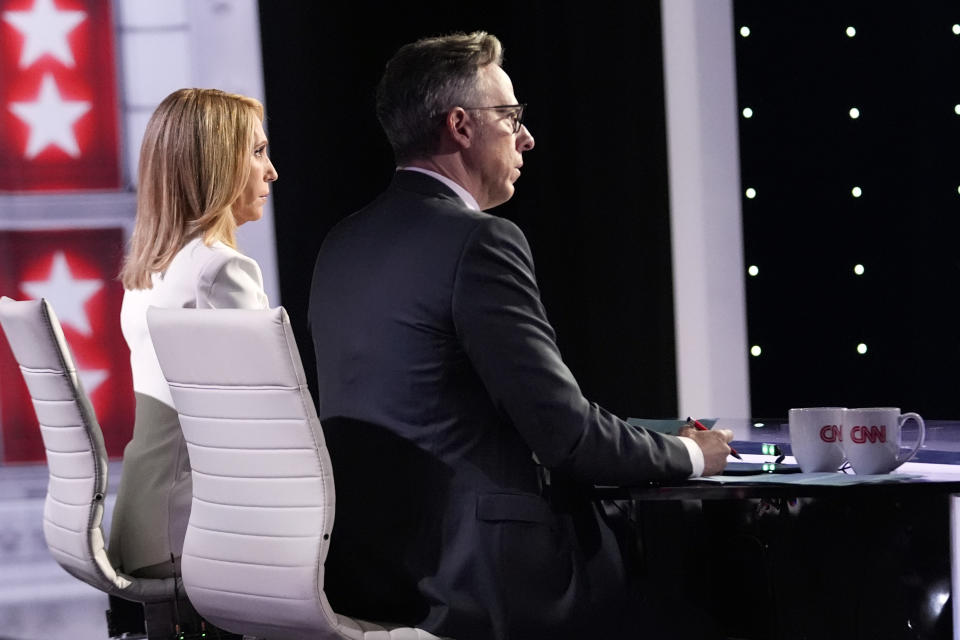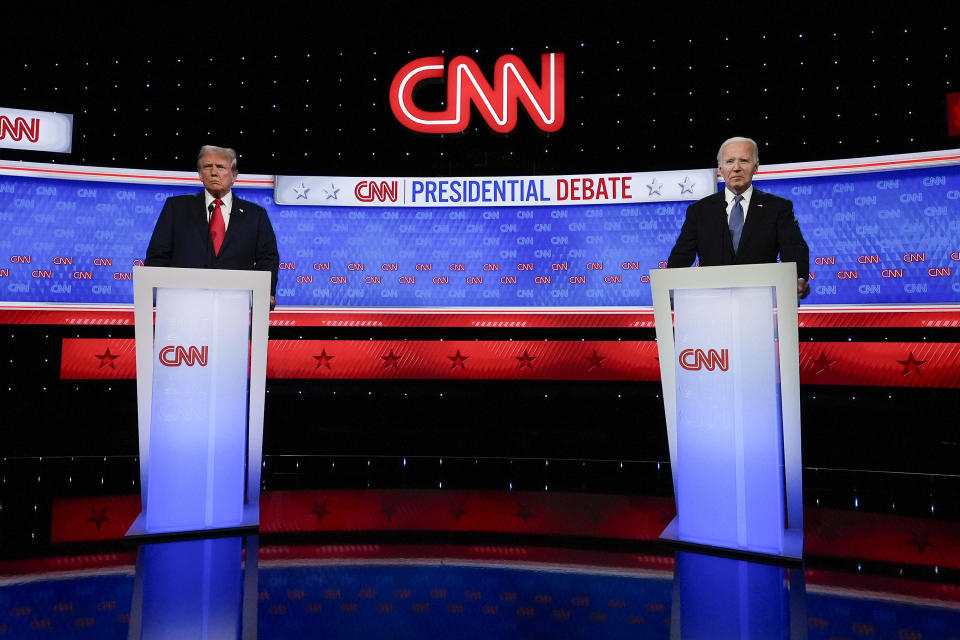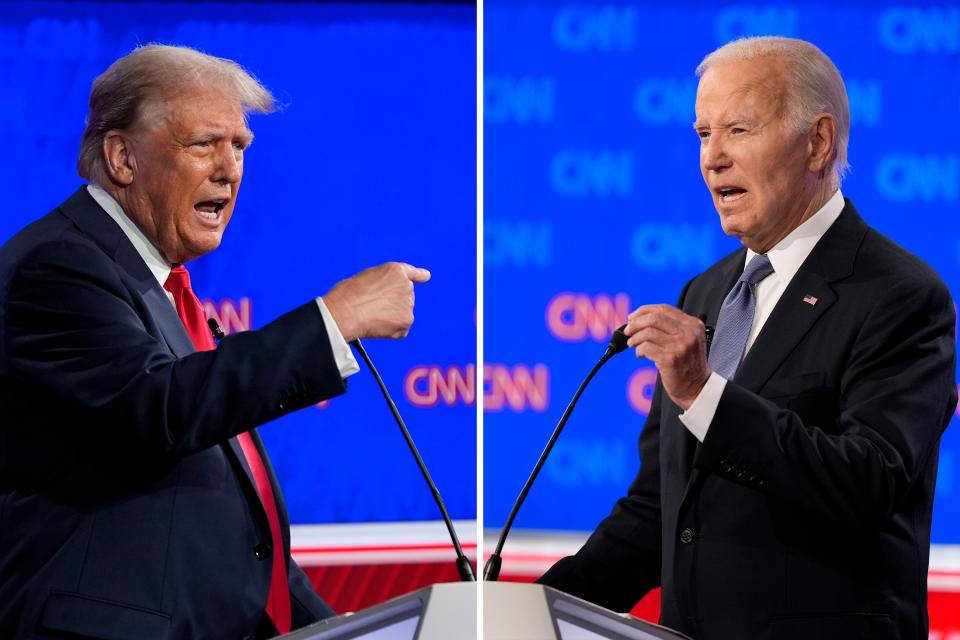Fact checks were prevalent during and after the Biden-Trump debate — but not for real-time viewers
NEW YORK (AP) — There were some exhaustive, independent fact checks of claims made during the CNN debate between Joe Biden and Donald Trump. Trouble was, none of them were available to the millions of people watching the two presidents in real time.
That was the result of CNN's decision ahead of Thursday's debate that moderators Dana Bash and Jake Tapper would be questioners, not arbiters. Supporters of President Biden were frustrated, since Trump was later flagged for more misleading statements than his rival, and it served to put greater emphasis on the Democrat's tepid performance.
At the same time, it emphasized a puzzle the media has yet to solve after nine years of Trump operating in the public arena as it relates to the presidency.
“I think that there is a very real question about whether it is possible to fact-check Donald Trump live on television,” said Jane Hall, author of “Politics and the Media: Intersections and New Directions” and an American University journalism professor. “He has confounded many different formats.”
False claims abounded
An estimated 51.3 million people watched the unusual June debate, according to a preliminary estimate by the Nielsen company. The first time these candidates met onstage in 2020, there were 73 million viewers.
Bash and Tapper held firm to their intentions, which CNN stressed was its own call and not part of the debate rules negotiated with the campaign. The journalists avoided follow-ups, though they had to restate questions a number of times when candidates ignored them.
CNN's Daniel Dale offered a report in which he said Trump had made at least 30 false claims, and Biden at least nine. But it wasn't shown on the air until more than an hour after the debate ended — just shy of midnight on the East Coast.
“I wish the CNN moderators did more fact-checking, letting the audience know when things are said that are flatly false,” columnist Nicholas Kristof of The New York Times wrote on X. “Not sure how it helps for a platform to transmit falsehoods disguised as facts.”
Bill Adair, a professor of journalism and public policy at Duke University who founded Politifact, said it's extraordinarily difficult to balance on-air corrections with the need to keep a conversation moving.
That said, “for them to be completely silent, I think, was going too far,” said Adair, who is no longer affiliated with Politifact. When Trump falsely claimed during an abortion discussion that Democrats supported killing live babies, one of the moderators should have stepped in, he said.
CNN expressed no regrets and was pleased with Bash and Tapper's performances. “Like a big game, when no one is talking about the referees the day after, we did our jobs,” one executive said privately.
What of the production itself?
The debate ran smoothly as a television production, particularly in comparison to the first 2020 debate that moderator Chris Wallace recalled Thursday as a “disaster,” and a poorly conceived Trump town hall in 2023 that was a factor in then-CNN chief Chris Licht's ouster.
It's not that Biden did not dispute Trump's statements; he did at least 10 times, according to the debate transcript.
“You're lying,” Biden told Trump during an abortion discussion. “Every single thing he said is a lie, every single one,” he said about veterans. “What he's telling you is simply not true,” he said about the Capitol insurrection. “He has no idea what the hell he's talking about,” he said when the topic was NATO. “It is simply a lie,” he said about Trump on Ukraine.
And there was the familiar Biden phrase: “I've never heard so much malarkey in my life.”
Yet the claims often lacked specificity, and a feeling of missed opportunity lingered. Biden “let every fastball hanging over the plate get by,” MSNBC host Joe Scarborough said on Friday.
Politifact pointed out 15 false statements made by Trump and another one — that Biden had allowed millions of people illegally into the country from jails and mental institutions — that it classified as a “pants on fire” lie. It cited three false statements by Biden.
The New York Times chronicled 20 false statements by Trump, with another 21 it said were either misleading, lacked context or lacked evidence. Its fact check pointed out no false statements by Biden, with 11 meeting the other characterizations. The Associated Press corrected 11 statements by Trump, four by Biden.
The Washington Post wrote that Trump “confidently relied on false assertions that have been debunked repeatedly” while Biden “stretched the truth occasionally.”
Some journalists, like Dale, fact-checked online during the debate, yet that required viewers to specifically pay attention to a second screen. Adair noted that at Duke, educators have experimented with ways to fact-check on television screens in real-time, yet automated efforts have largely failed and those led by humans require great speed.
Duke conducted one experiment with on-screen fact checks at a North Carolina television station in 2020, he said.
As yet, he said, he has seen little interest among television networks in doing anything similar this election cycle.
___
David Bauder writes about media for The Associated Press. Follow him at http://twitter.com/dbauder.




